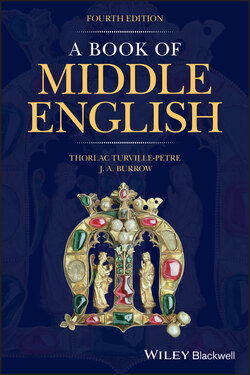Читать книгу A Book of Middle English - J. A. Burrow - Страница 60
5.4.2 Non‐expression of Personal Pronouns
ОглавлениеQuite regularly a personal pronoun, either subject or object, is not expressed in Middle English. As indeed in Modern English, the subject pronoun does not need to be expressed in a series of co‐ordinate clauses: þe niʒtingale hi iseʒ/And hi bihold and overseʒ, ‘the nightingale saw her, and beheld and watched her’, 2/29–30. There are other situations, however, where the subject pronoun would normally be expressed in Modern English but does not need to be in Middle English. A sentence may begin: Kimeð …, ‘(He) comes …’, 4/59, where the subject is understood from the previous sentence. The subject of the subordinate clause may be understood from the main clause, as in he watz sokored … þaʒ were wanlez of wele, ‘he was protected … though (he) was without hope of well‐being’, 8/262. When the subordinate clause precedes, the subject of the following main clause may be understood from it: Hwen ha ihereð þet god, skleatteð þe earen adun, ‘When they hear anything good, (they) flap their ears down’, 4/18–19. In other cases the unexpressed subject is clear from verb‐endings and other grammatical features, as in Or beggest thy bylyve, ‘Or (you) beg for your food’, 7a/29; and diden an scærp iren abuton þa mannes throte, ‘and (they/ people) put a sharp iron band round the man’s throat’, 1/30–1. The grammatical subject ‘it’ may be unexpressed: þagh had bene my fader bone, I bede hym no wranges, ‘though (it) had been my father’s murderer, I gave him no wrong decisions’, 11/243. Non‐expression of subject ‘it’ is especially common in impersonal expressions; see 5.6.8.
Similarly the object pronoun may be understood from the context. A straightforward example is lacche water / And cast upon þi faire cors, ‘fetch some water and cast (it) on your fair body’, 11/316–17. So also: þa þe castles waren maked, þa fylden hi mid deovles, ‘When the castles were made, they filled (them) with devils’ (hi is subject), 1/15–16.
